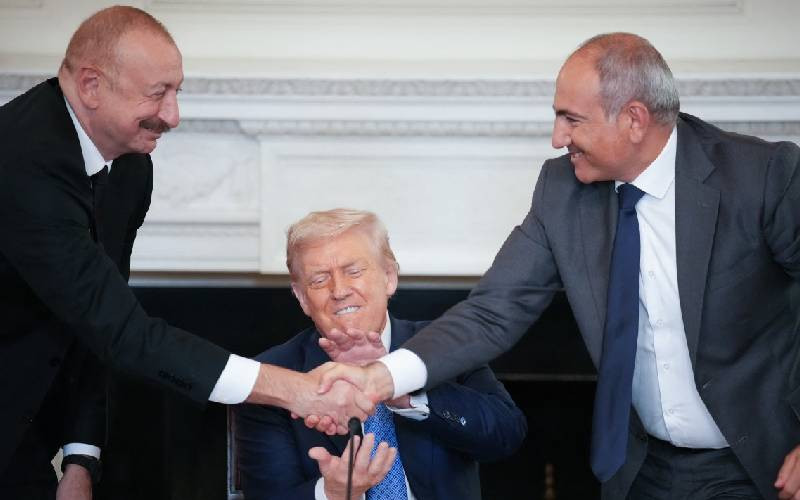Armenian Prime Minister Nikol Pashinyan on Saturday hailed a “historic” peace deal with Azerbaijan after signing an agreement aimed at ending a decades-long conflict.
Christian-majority Armenia and Muslim-majority Azerbaijan went to war twice over their border and the status of ethnic enclaves within each other’s territories.
“What happened today is a historic event. For months, I have been saying that there will be no war between Armenia and Azerbaijan, that there will be peace. Today, we can say that peace has been achieved,” Pashinyan said after signing the US-brokered deal in the White House on Friday.
There was no official reaction from Russia, previously the main power broker in the Caucasus.
Follow The Standard
channel
on WhatsApp
Both Armenia and Azerbaijan praised the US efforts in settling the conflict, and Azerbaijani President Ilham Aliyev even said he would back Donald Trump’s nomination for the Nobel Peace Prize.
The former Soviet republics went to war twice over the disputed Karabakh region, which Azerbaijan recaptured from Armenian forces in a lightning 2023 offensive, sparking the exodus of more than 100,000 ethnic Armenians.
Moscow, previously a key backer of Armenia, still has a military base there. It did not intervene in the latest conflict.
This has strained the historically warm ties between Yerevan and Moscow, home to a large and influential Armenian diaspora, triggering Pashinyan’s drift towards the West.
The 50-year-old politician, who came to power after leading street protests in 2018, started pushing an unpopular peace deal with Azerbaijan that would essentially renounce Yerevan’s claims to a region many Armenians see as their ancestral homeland.
Pashinyan’s peace push has sparked a public conflict with the powerful Armenian Apostolic Church, sparking protests and arrests of senior clerics.
Follow The Standard
channel
on WhatsApp
Armenian Prime Minister Nikol Pashinyan on Saturday hailed a “historic” peace deal with Azerbaijan after signing an agreement aimed at ending a decades-long conflict.
Christian-majority Armenia and Muslim-majority Azerbaijan went to war twice over their border and the status of ethnic enclaves within each other’s territories.
“What happened today is a historic event. For months, I have been saying that there will be no war between Armenia and Azerbaijan, that there will be peace. Today, we can say that peace has been achieved,” Pashinyan said after signing the US-brokered deal in the White House on Friday.
There was no official reaction from Russia, previously the main power broker in the Caucasus.
Follow The Standard
channel
on WhatsApp
Both Armenia and Azerbaijan praised the US efforts in settling the conflict, and Azerbaijani President Ilham Aliyev even said he would back Donald Trump’s nomination for the Nobel Peace Prize.
The former Soviet republics
went to war twice
over the disputed Karabakh region, which Azerbaijan recaptured from Armenian forces in a lightning 2023 offensive, sparking the exodus of more than 100,000 ethnic Armenians.
Moscow, previously a key backer of Armenia, still has a military base there. It did not intervene in the latest conflict.
This has strained the historically warm ties between Yerevan and Moscow, home to a large and influential Armenian diaspora, triggering Pashinyan’s drift towards the West.
The 50-year-old politician, who came to power after leading street protests in 2018, started pushing an unpopular peace deal with Azerbaijan that would essentially renounce Yerevan’s claims to a region many Armenians see as their ancestral homeland.
Pashinyan’s peace push has sparked a public conflict with the powerful Armenian Apostolic Church, sparking protests and arrests of senior clerics.
Follow The Standard
channel
on WhatsApp
By AFP


